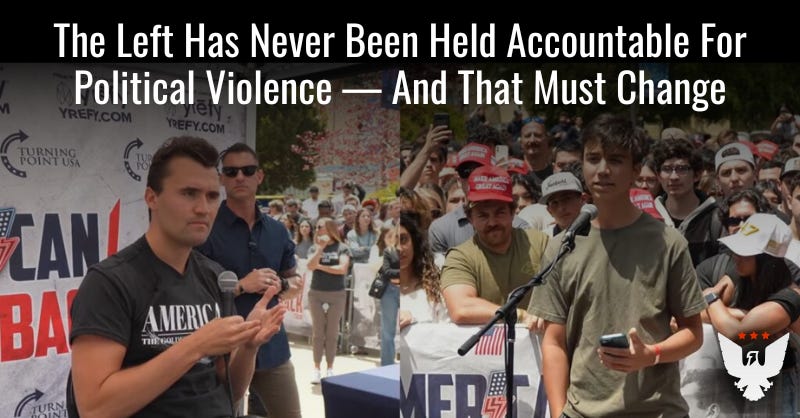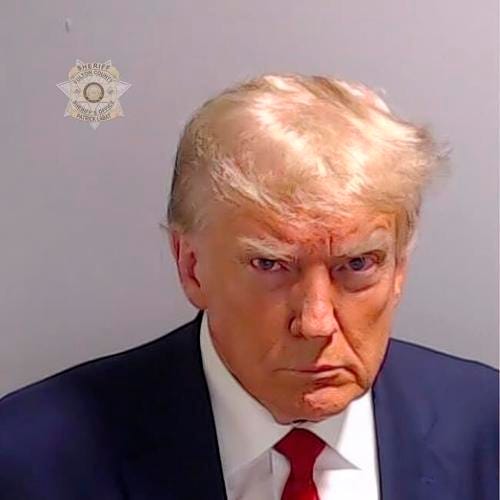The assassination yesterday of conservative activist Charlie Kirk, apparently by a Leftist or Antifa type (the killer is still at large) has raised hopes among conservatives of changing the culture (possibly with the help of Trump Administration Federal prosecutions) of Leftist violence against conservatives.
The Federalist’s Mark Hemingway writes in The Left Has Never Been Held Accountable For Political Violence — And That Must Change that
I do not want to live in a society where half the country simply uses whatever power is available to them to go after the other half. I do not believe the average Democrat voter believes that successfully engaging in good-faith debates on college campuses warrants death. But, and I am hardly alone here, I am increasingly concerned that there are forces on the left that cannot be debated, they must be made to feel pain until they stop. I pray that this can be done within the bounds of the law and the Constitution, not that the left has much cared about those restraints.
If that seems like a bleak future for American politics, well, that’s because watching one of America’s most promising young leaders die in front of our eyes is pretty damn bleak. We survived a civil war, and I pray for everyone involved in American politics that understanding and forgiveness will once again be this country’s guiding lights. But I am also reminded that there are times when vengeance is necessary and just, and millions of Americans will not stand for Kirk’s death to be in vain.

I too am hopeful that something can be done to halt the trend of Leftist violence against conservatives—but I’ve been hopeful before.
On September 11, 2001, 19 immigrants committed the worst mass murder in American history. They used a program called Visa Express (which let Saudis bypass normal visa applicant procedure) to get their visas.
The main point you need to remember about the September 11 attacks is that they didn’t change anything about immigration policy. On October 16, 2001, Dr. Norm Matloff wrote VDARE.com to say that
I found it interesting that so many of the writers were so sanguine over the prospect that the September 11 tragedy would facilitate long-overdue immigration reform. Though indeed the event did take the wind out of the pro-immigration camp’s sails, I believe that this effect will be both temporary and of limited degree.
The fact is that it has always been the case that most Americans, including most immigrant Americans, have been in the restrictionist camp. The problem has been that the wishes of the populace have always been trumped by the special interests, such as:
the ethnic-activist groups lobby
the manufacturing industry lobby
the farm lobby
the immigration lawyers’ lobby
the libertarians (often funded by other lobbies)
etc., etc., etc.
The events of September 11 have not changed this picture. True, the various lobbies have been temporarily muted in public, and this probably will prevent them in the near term from pushing their plans to liberalize immigration policy. But they will strongly resist any attempt to impose new restrictions on immigration, and unless the restrictionist majority in the populace can be mobilized, very few meaningful restrictionist reforms will be enacted (via legislation in Congress) or implemented (via changes to regulations and administrative practices by the executive branch).
This was illustrated this week [October 9, 2001] when Senator Feinstein withdrew her earlier proposal for a six-month moratorium on issuing visas to foreign students who wish to study in the U.S. After she first made her proposal a couple of weeks ago, the educational lobby—including not only universities and small colleges, but also many specialist institutions such as those offering English lessons—immediately pounced on her. She then withdrew the proposal. She then told a radio interviewer, in what I perceived to be a rather bitter, cynical tone, “These schools make lots of money from the foreign students, so I had to withdraw my proposal.”
Matloff was right, nothing changed. There has actually been more Muslim immigration into the United States after 9/11 than before.
There is hope, however. In 2001, one of the people who showed up to help at Ground Zero, with the aid of hundreds of his own employees, paid by him, doing rescue work in the rubble, was Manhattan property developer Donald Trump.

15 years after that, he was elected President on a platform on, among other things, stopping immigration from Muslim countries that supported terrorism. While it’s still an open question whether he was reelected in 2020—he didn’t wind up in office—he’s certainly the President now, and one thing he’s learned over the years since 2016 is the necessity of fighting back.


